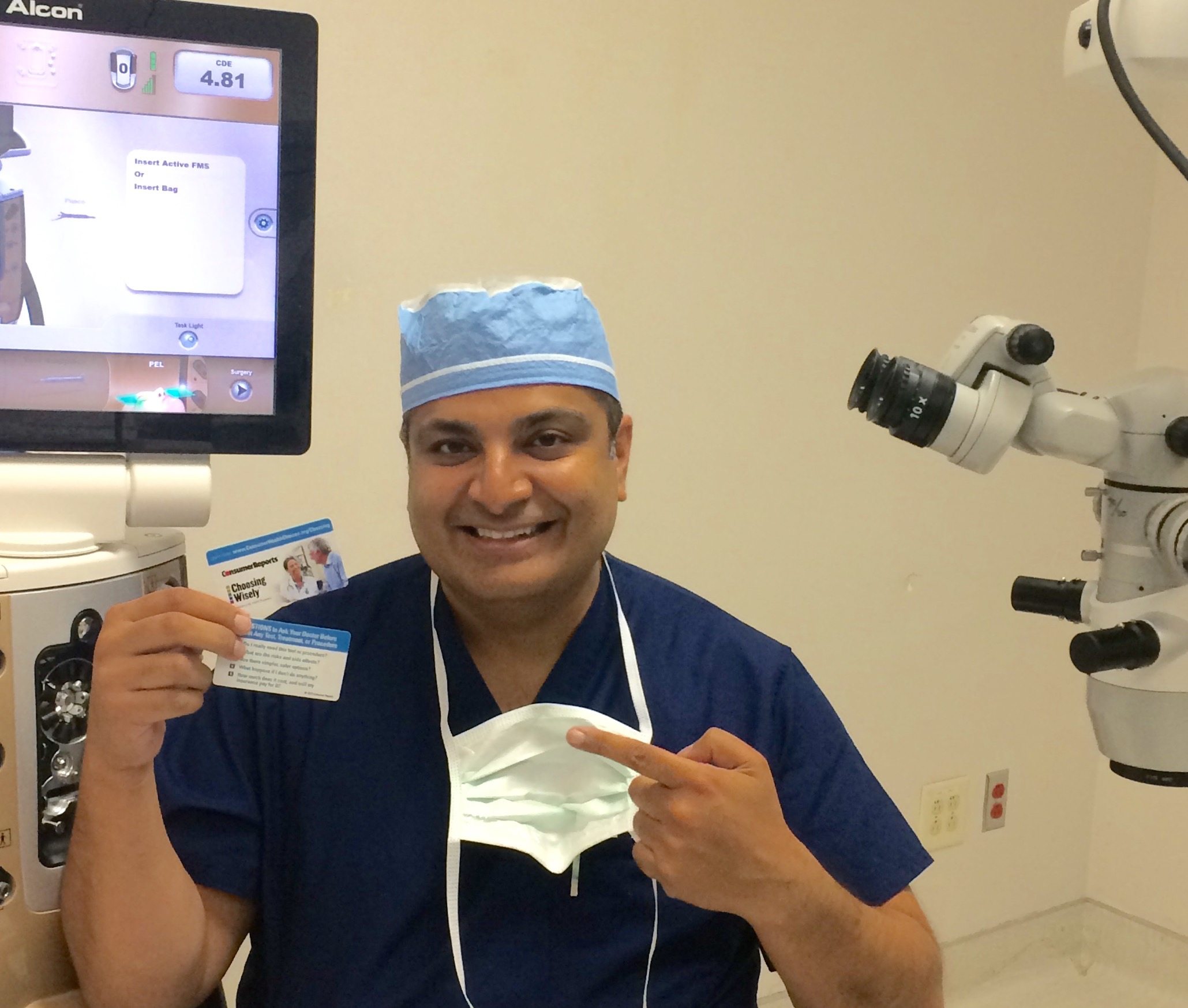
Uday Devgan, MD, FACS, FRCS
Consumer Reports has a Choosing Wisely campaign where they seek to educate patients about important healthcare decisions. They offer a pocket card with the 5 questions that are important to ask a physician prior to a treatment. This is very helpful and can save patients from unnecessary tests, treatments, or procedures and more importantly, it will help patients make informed decisions about their own health.
I am especially interested in these 5 questions because they emphasize the education and explanation that I give to each patient. I specialize in cataract surgery which is the most commonly performed surgery in the USA. A cataract is when the human lens, which is behind the blue or brown iris of the eye, becomes cloudy and opaque. Cataract surgery means that we remove the cloudy human lens from the eye and we replace it with a man-made lens. There are new types of lens implants which can also correct for reading vision, treat underlying astigmatism, and deliver 20/20 vision without glasses.
Everyone, you and me included, will eventually have cataract surgery if we live long enough. And cataract surgery is a critically important surgery because it is operating on our most precious sense, our vision. Take your time and do your research before making any decisions.
1. Do I really need this test or procedure?
Cataract surgery is a purely elective surgery that can help restore excellent vision and even reduce the need for glasses. But if you are currently seeing well enough to enjoy your daily activities like driving, watching television, and reading, then there is no rush to operate. As the saying goes, if it’s not broken, don’t fix it. Generally, I recommend that patients wait until they are noticing trouble reading street signs, difficulty with night vision, or inability to read despite using glasses before considering cataract surgery. Again it depends on the patient since someone such as an airplane pilot will likely want to restore his vision to 20/20 earlier than a typical patient who doesn’t have such visual demands.
2. What are the risks and side effects?
When done the most advanced way, the risks for cataract surgery are very low. More than 99% of patients can have a successful cataract surgery and a great visual outcome. The worst possible risk is endophthalmitis, means that an infection occurs in the eye after the surgery and can damage the vision, which occurs in about 1 in 3,000 patients. More common side effects include damage to delicate intra-ocular structures such as the lens capsule or iris which occurs in less than 1% of cases when performed by an expert surgeon. The man made lens that is implanted at the time of cataract surgery has excellent optical qualities but it is not as good as the healthy, natural lens in young people. Like with all other medical implants such as artificial hips or heart valves, nothing is as good as being young and healthy. Some patients report glare, halos, or other visual issues with the lens implants. Fortunately, this is relatively uncommon and the vast majority of patients report far improved vision after cataract surgery.
3. Are there simpler, safer options?
If the cataract changes are mild, then perhaps a change in your glasses prescription may be sufficient to improve your vision. But if the cataract is becoming significantly opaque, then the only way to improve your vision is cataract surgery. Research is being done to develop alternative therapies and medications which may improve cataracts, but that is still many years from being FDA approved and widely available. Recent developments have made cataract surgery much safer than in the past. We now have lasers and ultrasonic methods of assisting with cataract surgery so that it can now be done without needles, stitches, or even an eye patch. The surgery is bloodless and takes about 10 minutes, with most patients achieving excellent vision within a day or two. Anesthesia for cataract surgery is very light with just a mild degree of sedation while the eye is numbed with eye drops.
4. What happens if I don’t do anything?
There is no rush to operate and you can delay doing cataract surgery for months or even years. If you’re happy with your current vision and it’s not too blurry, do nothing. The cataracts will typically worsen as you age and you may notice further visual decline. When you finally feel that you can’t stand having poor vision and you want to restore your vision, then consider cataract surgery. When cataracts become severe they can cause blindness but even then surgery can help to improve the vision.
5. How much does it cost, and will my insurance pay for it?
Yes, most insurance plans and Medicare will cover the cost of cataract surgery when it is deemed medically necessary. The typical allowed charge for the surgeon fee is about $700 under Medicare with the anesthesia fee and the facility fee for use of the operating room and supplies billed separately by those entities. The fees to correct underlying focusing issues such as astigmatism, to implant specialized lenses, or to use laser assistance in surgery are considered non-covered costs and the fees, which can be a few thousand dollars per eye, are paid directly by the patient.
Cataract surgery will affect that you see the world, every waking moment, for the rest of your life. Modern techniques of advanced cataract surgery are able to restore excellent vision to the vast majority of patients. Do your homework and make sure that you go through Consumer Reports’ 5 Questions before making any decision and see Dr. Uday Devgan for a consultation to discuss all of your options.